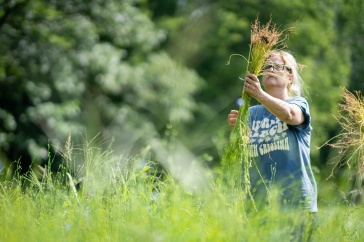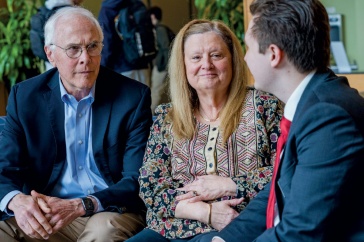
It all started in Italy in 1986, when journalist Carlo Petrini was informed that a McDonald’s franchise was planning to open a store at the base of the Spanish Steps in Rome. Outraged, Petrini gathered members of the community to protest against the global industrialization of food and warn others of the culinary costs of such eating practices. However, instead of waving signs and banners, Petrini armed his fellow protestors with bowls of pasta to give to the crowd.
“We don’t want fast food; we want slow food,” the crowd chanted, giving name to the crusade that would officially be founded in 1989. Slow Food is now a global, grassroots organization with 150,000 members and 2,000 food communities in more than 150 countries across the globe. Slow Food USA, founded in 2000, has 200 local and campus chapters and 12,000 members nationwide. There are five community chapters in New Hampshire, one of which is right here on the Durham campus.
“We are enslaved by speed and have all succumbed to the same insidious virus: fast life, which disrupts our habits, pervades the privacy of our homes and forces us to eat fast foods,” the official Slow Food manifesto states, summarizing the driving force behind the movement: to promote good, clean and fair food for all.

Slow food is produced or prepared in line with local culinary traditions, typically using high-quality, locally grown ingredients. Slow food is good for the consumer, for the environment and for the people who grow, pick and prepare it. By choosing to be a part of the movement, individuals recognize that the growing reliance on fast food is damaging not only to health but also to cultural food traditions.
The movement also stresses the importance of animal welfare by encouraging the public to choose smaller, family-run farms over large, fast-paced factory farms, grow their own food or shop at local farmers’ markets to ensure their food is produced cleanly and producers are treated fairly.

The movement is still growing, and local chapters are working hard to spread its principles and ideals. UNH Slow Food promotes these ideals by organizing community potlucks and other events. The club, which has about 30 members, meets weekly to take part in cooking demos and other activities. Club members have the opportunity to go on several field trips, the most recent to Disco Soup Boston, an event put on by Boston Slow Food where guests come together to enjoy music and prepare food that will be donated.
UNH Slow Food’s largest event is Slow Life Sunday, a free, all-day extravaganza put on annually in collaboration with other student organizations such as the Yoga Club, Peace and Justice League and the Organic Gardening Club. Past Slow Life Sundays have included guest speakers, tie-dyeing, potluck dinners and a contra dance.
For those on campus interested in learning more about living the Slow Food life, stop by the Memorial Union Building's entertainment center on Tuesdays from 6 to 7 p.m. To learn more, visit the UNH Slow Food Club on Facebook.
-
Written By:
Katy Gioeli '18 | Communications and Public Affairs



















































